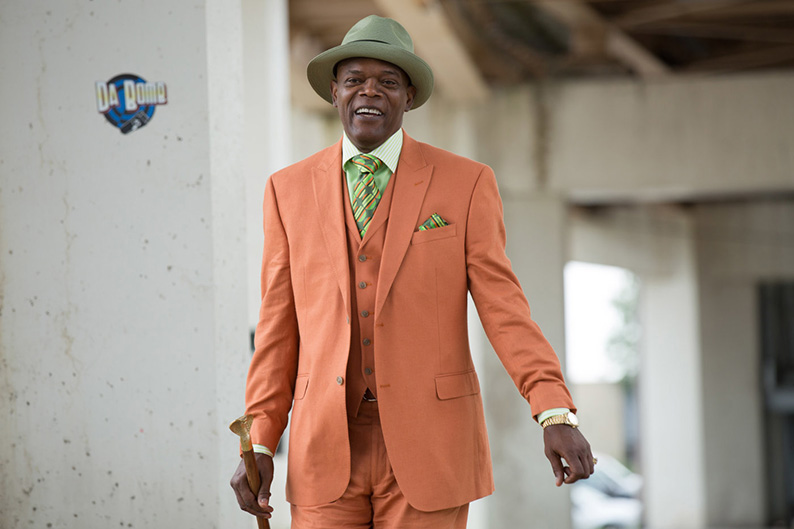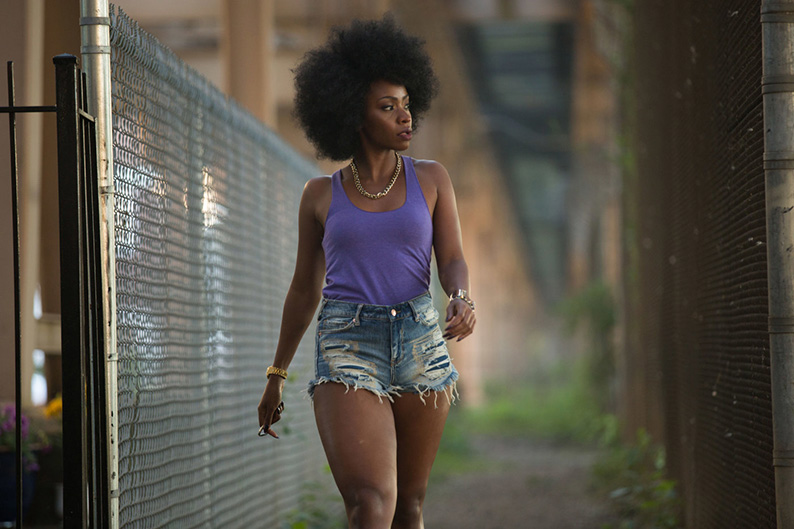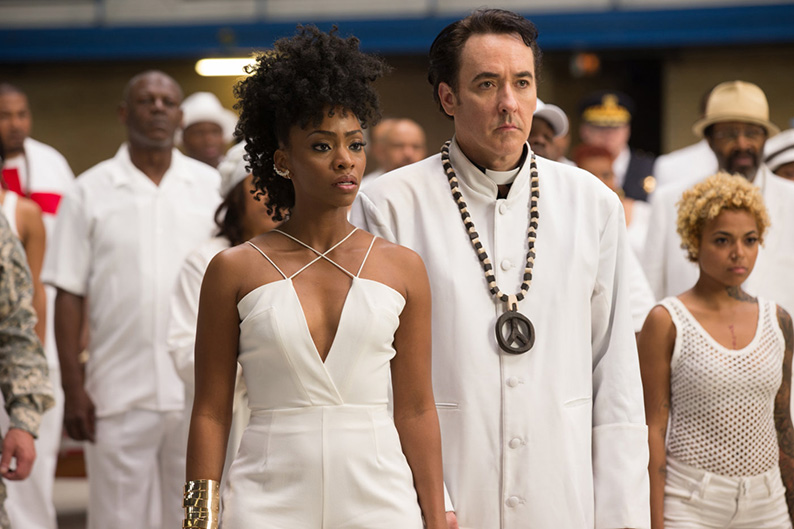|
As many will know, Spike Lee came to prominence in the late 1980s as a black auteur with a talent for observing the realities of the world he knew, politically, socially and emotionally. His first films were filled with a youthful vigour and energy and a special kind of creativity that matched the growing hip-hop 'movement' of the time and place. As he entered the 90's his rise in popularity allowed him to work on bigger projects like Malcolm X, and although largely focussing on black American culture he diversified with films such as Summer of Sam, an underrated 1970's disco crime drama, centering on Italian American youth culture and, amongst other things, it's conflict with the emerging punk aesthetic. What followed the 90's for Lee was a string of less inspired works that mirrored his earlier social satire but failed to have the bite or freshness. I think many saw his frankly unnecessary remake of the Korean masterpiece Oldboy as the final nail in Lee's creative coffin.
So how to take the knowledge of a new Spike Lee 'joint' with all the hallmarks of his earlier sense of place, satire and creativity? It was as easy to be cynical as hopeful for me, and I held off watching Chi-Raq after hearing as much damning as praise in the thumbed pages of magazines and newspapers and the brightly lit ones of social media. I can say now, however, on seeing the film, I fall dismayingly but firmly on the negative side of the argument...
The central conceit is framed by Aristophanes’ Lysistrata, an ancient Greek comedy about a woman who leads a sex-strike to bring peace during the Peloponnesian War. The theatrical set-up is backed up with characters speaking in a form of loosely rhyming verse, a one-man Greek chorus in the shape of Samual L. Jackson, and the odd musical set piece. The premise is interesting enough to get cinephiles salivating, but the film lives and dies on how well this concept is realised and thus how much we as an audience buy into it.

The whole thing begins with a musical introduction that in Lee's hayday may have seemed interesting, but in today's world it really just evokes a sing-a-long, homemade, Youtube music video. I am doubtful that was the aesthetic he was intending, but it certainly does connect us with the language of contemporary media nonetheless. The fact the lyrics are not particularly captivating unfortunately doesn't help, but it does give off an earnest desperation to be taken seriously which is ladled all over this film, despite attempts at humour.
The grim opening continues to detail the reason Chicago has been nicknamed Chi-raq, which is due to it's bodycount outweighing that of US military deaths in the most recent Iraq conflict. It is a sobering thought, but this is one of the main emotional hooks Lee uses to hang the film on. As someone who doesn't think the USA should have been in Iraq anyway, I had a problen connecting to this exact motif, yet I am suitably horrified by the scale of violence and innocent deaths in this focal area of America. To Lee and co-writer Kevin Willmot's credit, they emphasise the importantance in the destinction between the innocent victim, and the gang members or police officers he sees as the perpetrators of the violence (not to say they could not also be victims in their own way). The early shooting of a young girl reinforces this and makes it real in the world of the film.
But before that we are introduced to the main players of the piece in a night club scene, which is paused to show Jackson addressing the camera in the first of his fourth wall breaking in-verse monologues. When the scene is unfrozen, protagonist Lysistrata (Tayonah Parris) and her friends are watching her boyfriend, the rapper and gang leader Chi-Raq (Nick Cannon) onstage. Gunshots are fired and violence breaks out, clearing the club as everyone scatters in a panic, leaving only bodies of fallen gangsters. It is a scene that works quite well but for the use of text message-esque captions that I found an unnecesary distraction, although this does set the technique up for better use later in the film. What follows is the first one-on-one exchange of dialogue and a scene exposing a lack of chemistry between the what is essentially the central romance. The two love birds, Parris and Cannon, are found in the latter's bedroom, talking about the shooting at the club. The verse speech starts off just sounding like a rather stilted conversation and any intimacy is therefore left to the players' body language, which attempts intimacy. The temperature rises in the room both figuratively as the couple start to get it on, and literally when the place is set alight. The source of this arson is Cyclops, the leader of Chi-raq's rival gang, played by Wesley Snipes. He is seen outside, and this brief introduction to his character was enough to grate on me thanks to his his absurd pantomime theatrics (more on this to come). So, the context of the rivalry between Ch-Raq's Spartans and Cyclops' Trojan gang has been framed. The mise-en-scene underlines this by having the two groups boldly colour coded. At this point I was getting the impression of something akin to Baz Lurman does Boyz N The Hood, a feeling I was never quite able to shake off.

However, the heartstrings are given a tug during the aforementioned scene involving an innocent victim of the violence, where Lysistrata comes upon a crowd on the street surrounding the body of a small girl who was caught in the crossfire of gang dispute. This has become a well trodden tableau of gang movies and making it stagy when the girl's mother laments to the onlookers in the bizarre verse-patois does little to breathe new life into it (excuse the gallows pun). This scene is an important one and the first to really showcase Lee's mixture of realism and melodramatic theatre, and it failed to grip me in the way I feel it should have as a main emotional hook, as it is from this event Lysistrata is shocked and inspired into action. She develops the idea of the sex-stike by consulting the internet after a community matriarch figure, Miss Helen, played by Angela Bassett, plants a seed in her mind. Bassett is an asset to the film and is possibly the one who carries the most weight when onscreen, having a very powerful presence the younger Parris is not quite able to convey, even when chanelling her full Beyonce (something given a nod to by one of Jackson's interjections). Jackson himself commands the screen, but the nature of his role focuses our sole attention on him, whereas Bassett shines in scenes that she shares with one or more character, somehow making her dialogue work. Hers is the only part where I found the words spoken convincing in any real way, and I attribute that to her class as an actor.
Now, to John Cusack. Cusack has done well in taking on good roles in independent American cinema, from Woody Allen's Bullets Over Broadway in 1994 to Spike Jonze and Charlie Kaufman's madly genius Being John Malkovich. But since 2012's fantastic and often overlooked The Paperboy, this is the first exciting role he has landed, so I was very much interested in what part he had to play here. Cusack's role in Chi-Raq is that of the local priest, Father Mike Corridan. A holy man and a passionate crusader for peace, Father Mike is key in trying to bond the community. That he is one of very few white people in the neighbourhood is possibly underlined a little too boldly in his later conversation with Cannon's character towards the film's end. But Cusack's defining scene is a set-piece that again suffers from the script's overly on-the-nose set-ups, in the form of a sermon at the young girl's funeral. The sequence opens with a gospel dance number that only helps to muddy the tone, then Cusack's gravelly throated preacher rumbles Lee and Willmott's words with all the vigour of the evangelist, exuding affinity with African culture in his given costume of dashiki and beads over the traditional Christian cassock. This earnest monologue is centred around the 'life' of a neighbourhood gun – how it has its own distuctive narrative, shaped by the choices of individuals. Cusack gives all he can, but the fact we are literally being preached at is devoid of any discernible irony. It points to the film's problem with tone as the serious parts are painted with the same bold cartoonish strokes as scenes that are supposed to be more satirical or comical, weakening the impact on both ends. To that point I can't help thinking that in this feminist environement the women create, the impotence of masculinity has been overly lampooned, with most male characters seen as pretty one-dimensional. I wonder if it is a fault with Lee's direction or the actors themselves just missing the intended mark. For example, Snipes as Cyclops is dressed like some rainbow and glitter Mad Max villain, and his performance has all the wackiness of his turn in Demolition Man with none of the threat. In fact, for a guy who does menacing pretty well, he seems to be lacking in that department here, going for a Ledger as Joker kind of unhinged but just coming off as annoying. Not a lot better is Nick Cannon's soul-searching eponymous gang leader, who acts like a sulky teenager throughout the film. If all he is supposed to be is a typical gangster that's fine, I suppose. But this is the man who should embody 'Chi-Raq' as a concept, and is supposed to be torn apart by the ideas and ethos instilled in him by his life on the streets pitted against the opportunity for a new and uncertain order of things; the opportunity for a sense of peace within himself, a cleansing. It seems that Cannon is not up to this task though, as one assumes the reason for the lack of depth requires the talents of a better actor, but again, I can't be certain the problem doesn't lie with Willmott and Lee in their concept and characterisations lacking depth.

The thing is, you cannot fault Lee's intentions in bringing to light another example of the destructive power of gang culture and the politics behind it, but it falls into the same waters as The Birth Of A Nation and A United Kingdom as recent films that are not able to live up to the important political statement their stories are trying to make. I can see Lee has tried to put a new slant on a topic close to his heart and one that has not gone away since the first wave of films about this kind of gang violence, not to mention the highly questionable way the police in these areas ofter deal with matters. He is right that it is still something that deserves scrutability, but I would suggest Lee's ambitions and the work produced lie someway apart from each other. He is battling his rage and soapbox evangalising with the attempts at comedy and the two never really sit well together. The whole staged feel with the bold use of costume, set and music can blur lines between caricuture and more serious commentary, and I think attempts at humour are often quite noticably shoehorned in, and very rarely funny. The contemporary and historical name-dropping from the Jim Crow laws and Rosa Parks to contemporary celebrities can seem slapdash and too pointed, ending up with sizable parts of dialogue sounding like essays on civil rights (with a joke about how a middle class black fellow is a fan of gangster rap tacked on, in one instance).
Throwing too many conceptual ideas into the pot has created something that doesn't hang together in it's entirety, but I am aware of how damning this review has been and there are positives to take from Chi-Raq where Spike Lee is concerned; hopefully this marks a renewed interest in ambitious projects, and maybe his next will coalesce into something like the magic he managed to weave in earlier days. Fans are already getting excited over whispers of a Netflix commissioned TV serial version of She's Gotta Have It, which will apparently be directed by Lee himself. Perhaps that will be the return to form I was hoping of Chi-Raq? |